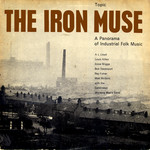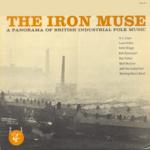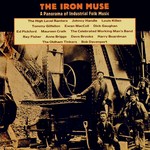> Folk Music > Records > The Iron Muse
The Iron Muse
 |
The Iron Muse Topic Records 12T86 (LP, UK, March 1963) |
 |
Recorded by Bill Leader and Paul Carter
at Champion’s in Hampstead, London, on 17 November 1962;
Produced by A.L. Lloyd
For the authenticity of the supposedly traditional versions of the songs on this album, which were more often than not heavily edited or rewritten or set to new tunes by A.L. Lloyd without him stating so, see e.g. Brian H. Peters: Authenticity Versus Creativity in the English Folk Song Revival, in The Routledge Companion to English Folk Performance, London: Routledge, 2021 .
Musicians
Anne Briggs,
Bob Davenport,
Ray Fisher,
A.L. Lloyd,
Matt McGinn: vocals;
Louis Killen: vocals, banjo, concertina;
The Celebrated Working Man’s Band:
Alf Edwards: concertina;
Colin Ross: fiddle;
Jim Bray: double bass
Tracks
The original Topic record has one more track (A11) than the Elektra one; both have different track orders.
Topic LP
Side 1
- [CWMB] Miner’s Dance Tunes: Newburn Lads / The Bonny Pit Laddie / The Drunken Collier
- [BD] The Collier’s Rant (Roud 1366)
- [AB] The Recruited Collier (Roud 3503)
- [ALL] With Me Pit Boots On (Roud 516; G/D 4:787)
- [LK] The Banks of the Dee (Roud 3484)
- [MM] The Donibristle Moss Moran Disaster (Roud 3509)
- [BD] The Durham Lockout (Roud V13079)
- [LK] The Blackleg Miners (Roud 3193)
- [ALL] The Celebrated Working Man (Roud 3486)
- [BD] The Row Between the Cages (Roud V35950)
- [CWMB] The Collier’s Daughter
Side 2
- [CWMB] The Weaver’s March
- [ALL] The Weaver and the Factory Maid (Roud 17771)
- [RF] The Spinner’s Wedding (Roud 12503)
- [ALL] The Poor Cotton Wayver (Roud 937)
- [AB] The Doffing Mistress (Roud 2133)
- [MM] The Swan Necked Valve
- [RF] The Dundee Lassie (Roud 21588)
- [MM] The Foreman O’Rourke
- [LK] Farewell to the Monty
- [CWMB] Miner’s Dance Tunes: The Jolly Colliers / The Keelman ower Land / Sma’ Coals an’ Little Money
Elektra LP
Side 1
- [ALL] The Celebrated Working Man (Roud 3486) (1.28)
- [BD] The Collier’s Rant (Roud 1366) (1.45)
- [AB] The Recruited Collier (Roud 3503) (2.34)
- [ALL] With Me Pit Boots On (Roud 516; G/D 4:787) (2.03)
- [LK] The Banks of the Dee (Roud 3484) (2.21)
- [BD] The Row Between the Cages (Roud V35950) (1.45)
- [BD] The Durham Lockout (Roud V13079) (3.05)
- [LK] The Blackleg Miners (Roud 3193) (1.20)
- [MM] The Donibristle Moss Moran Disaster (Roud 3509) (3.10)
- [CWMB] Miner’s Dance Tunes: Newburn Lads / The Bonny Pit Laddie / The Drunken Collier (1.35)
Side 2
- [CWMB] The Weaver’s March (0.45)
- [ALL] The Weaver and the Factory Maid (Roud 17771) (2.23)
- [RF] The Spinner’s Wedding (Roud 12503) (1.30)
- [ALL] The Poor Cotton Wayver (Roud 937) (3.35)
- [MM] The Swan Necked Valve (2.37)
- [AB] The Doffing Mistress (Roud 2133) (1.20)
- [MM] The Foreman O’Rourke (3.39)
- [RF] The Dundee Lassie (Roud 21588) (1.33)
- [LK] Farewell to the Monty (3.09)
- [CWMB] Miner’s Dance Tunes: The Jolly Colliers / The Keelman ower Land / Sma’ Coals an’ Little Money (2.08)
A.L. Lloyd’s Sleeve Notes
What is folk song? The term is vague and seems to be getting vaguer. However, the songs on this record may conveniently be called “industrial folk songs” for without exception they were created by industrial workers out of their own daily experience and were circulated, mainly by word of mouth to be used by the songwriter’s workmates in mines, mills and foundries. That other branch of workers’ song, made by learned writers and musicians on behalf of the proletariat and passed on chiefly through print is not represented on this record. However excellent, such songs belong to a different order and require some other label than that of “folk song”. Here, we repeat, our concern is with songs made by working people out of their own traditions and for their own use.
The folk songs of industrial workers have not been much noticed. Cecil Sharp and other great collectors confined themselves to the rural past and rather shunned the industrial present. Thereby they allowed themselves only a partial view of Britain’s musical folklore, for in fact the industrial community has much to show of traditional song native to itself, and indeed the creation of folk song has passed almost entirely into the scope of the working class of the towns within the last century or so as this record may suggest. Though the performance of folk song lingered on in the countryside, the composition of new stuff had to all intents ceased in the villages by the mid-19th century; but among industrial workers the creation of new songs celebrating strikes, pit disasters, workshop incidents etc. persisted and seems lately to have taken a fresh lease of life in somewhat altered circumstances.
We have said that industrial folk song has been neglected hitherto. As far as the light of present knowledge extends, the richest store seems to be found among miners and textile workers. Mining, spinning and weaving are occupations that provided themes for many songs well before the industrial revolution began to affect popular culture in the latter half of the 18th century. Subsequent industrial developments—steel, railways, etc.—which lacked this early fund of song, seem to have remained much weaker in poetry and music than the older traditional industries among whom good songmakers, some of them youngsters, are still to be found. But it must be said that as yet the ground is little explored and surprises may be in store for the searcher. What is so far found, of old stuff and new, is a reproof to those who profess to believe that the cultural horizon of the working class is bounded by the bingo hall and the idiots’ lantern. It is true that most of these songs have only a limited circulation; it is also true that the circulation is widening. As yet the industrial community is only dimly aware of its own self-made cultural heritage; but that awareness is growing. This record, in a brief survey, presents but a few of the songs that working men and women have made out of their own lives. If it helps to make the songs wider known, good. If it inspires the making of new industrial songs, better still. The tradition is a fine one and worth perpetuating.
Review
This review is from Gramophone, September 1963:
Posterity, in the persons of the folk-song students of, say, 2063, is likely to have a warm spot in its heart for Topic Records. No other British company has recorded the folk music of this island with such dedication, such an absence of commercial tidying-up, and—last but by no means least—in such copious quantities. Four recent Topic LPs “and four of the best”give some idea of the scope and painstaking approach of this company. The first of these, The Iron Muse (12T86), sub-titled “A Panorama of Industrial Folk-Song”, is exactly that. Planned by A. L. Lloyd, and with an excellent four-page insert (with complete texts) also compiled by that authority, it presents a collection of material ranging from The Collier’s Rant (eighteenth century) up to present-day compositions. The singers are Anne Briggs, Bob Davenport, Ray Fisher, Louis Killen, A.L. Lloyd and Matt McGinn, and there is also a small instrumental group (fiddle, concertina, bass) which interpolates a few marches and dances. Most of the songs are little known, some of them more purely functional (dealing with just a particular event, a particular set of circumstances) than others. Among the outstanding performances are Louis Killen’s versions of The Banks of the Dee (the lament of a miner who can’t get work because he is too old), The Blackleg Miners (very terse, very effective) and the elegiac Farewell to the Monty. Other exceptional tracks include The Recruited Collier (very tender and sad) and The Dundee Lassie.
> Folk Music > Records > The Iron Muse
The Iron Muse
 |
The Iron Muse Topic Records TSCD465 (CD, UK, 1993) |
Despite the same title, this is not a reissue of the above LP but a compilation with only eight tracks from the name-giving album and a with lot of other musicians. Especially, not a single song by the original album’s arranger A.L. Lloyd made it onto this compilation.
Tracks
- The High Level Ranters feat. Johnny Handle: The Sandgate Girl’s Lament (Roud 3170) / Elsie Marley (2.46)
- The High Level Ranters feat. Johnny Handle: Doon the Waggonway (Roud 3480) (1.26)
- Tommy Gilfellon: A Miner’s Life (3.44)
- Ewan MacColl acc. Peggy Seeger: The Coal-Owner and the Pitman’s Wife (Roud 44465) (3.33)
- Louis Killen: The Trimdon Grange Explosion (Roud 3189) (3.14)
- Louis Killen: The Blackleg Miners (Roud 3193) (1.19)
- Dick Gaughan acc. Alistair Anderson: The Auchengeich Disaster (2.18)
- Ed Pickford: Ee Aye, Aa Cud Hew (2.18)
- Maureen Craik acc. Colin Ross: The Durham Lockout (5.21)
- The High Level Ranters feat. Johnny Handle: Aa’m Glad the Strike’s Done (3.08)
- The Celebrated Working Man’s Band: The Weaver’s March (0.51)
- Ray Fisher: The Spinner’s Wedding (Roud 12503) (1.34)
- Ewan MacColl acc. Peggy Seeger: Oh, Dear Me (The Jute Mill Song) (Roud 2585) (1.17)
- Anne Briggs: The Doffing Mistress (Roud 2133) (1.25)
- Dave Brooks: The Little Piecer (1.13)
- Harry Boardman acc. Lesley Boardman and Bob Diehl: The Hand-Loom Weaver’s Lament (2.41)
- Ray Fisher: The Dundee Lassie (Roud 21588) (1.37)
- The Oldham Tinkers feat. John Howarth: Success to the Weavers (Roud B56099) (2.52)
- Ewan MacColl acc. Peggy Seeger: Fourpence a Day (Roud 2586; TYG 107) (1.16)
- Louis Killen: Up the Raw (Roud 3155) (1.15)
- Dick Gaughan: Bonny Woodha’ (Roud 3778; G/D 5:947; Henry H476) (3.28)
- Louis Killen: The Banks of the Dee (Roud 3484) (2.28)
- Bob Davenport acc. The Celebrated Working Man’s Band: The Row Between the Cages (1.51)
- Louis Killen acc. Colin Ross: Aw Wish Pay Friday Would Come (3.17)
- Louis Killen acc. Colin Ross: Keep Your Feet Still, Georgie Hinny (Roud 6862) (3.17)
- Louis Killen: Farewell to the Monty (3.12)
The tracks were taken from these original Topic LPs:
#5, 24: Louis Killen, Colin Ross, Johnny Handle: The Colliers’ Rant (TOP75, 1962)
#20, 25: Louis Killen, Colin Ross, Johnny Handle: Northumbrian Garland (TOP75, 1962)
#6, 11-12, 14, 17, 22-23, 26: The Iron Muse. A Panorama of Industrial Folk Music (12T86, 1963)
#4, 19: Ewan MacColl: Shuttle and Cage (10T13, 1957) and Steam Whistle Ballads (12T104, 1964);
#13: Ewan MacColl: Second Shift (10T25, 1958) and Steam Whistle Ballads (12T104, 1964);
#9: Louis Killen, Tom Gilfellon, Colin Ross, Maureen Craik, Johnny Handle: Tommy Armstrong of Tyneside (12T122, 1965)
#1: The High Level Ranters: Northumberland For Ever (12T186, 1968)
#16: Deep Lancashire (12T188, 1968)
#15: Owdham Edge (12T204, 1970)
#18: The Oldham Tinkers: Oldham’s Burning Sands (12T206, 1971)
#8: Canny Newcassell (12T219, 1972)
#2-3, 7, 10, 21: The High Level Ranters with Harry Boardman and Dick Gaughan: The Bonny Pit Laddie (12T271/2, 1975)

